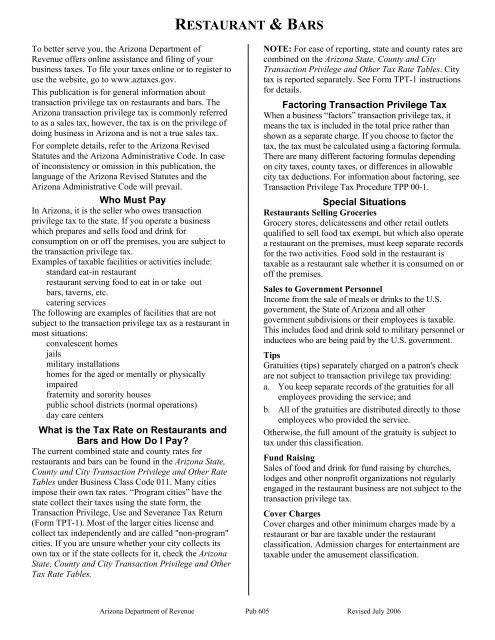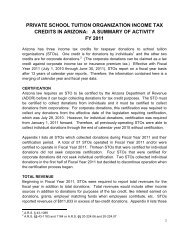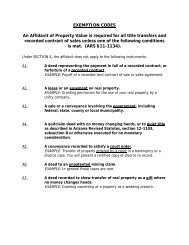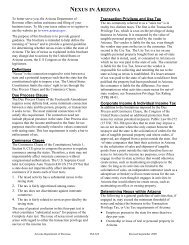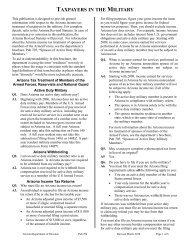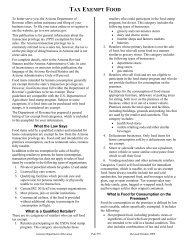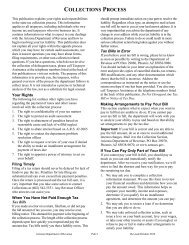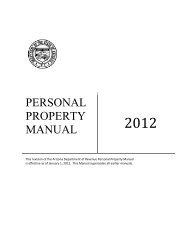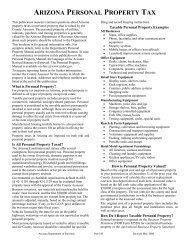RESTAURANT & BARS - Arizona Department of Revenue
RESTAURANT & BARS - Arizona Department of Revenue
RESTAURANT & BARS - Arizona Department of Revenue
You also want an ePaper? Increase the reach of your titles
YUMPU automatically turns print PDFs into web optimized ePapers that Google loves.
To better serve you, the <strong>Arizona</strong> <strong>Department</strong> <strong>of</strong><br />
<strong>Revenue</strong> <strong>of</strong>fers online assistance and filing <strong>of</strong> your<br />
business taxes. To file your taxes online or to register to<br />
use the website, go to www.aztaxes.gov.<br />
This publication is for general information about<br />
transaction privilege tax on restaurants and bars. The<br />
<strong>Arizona</strong> transaction privilege tax is commonly referred<br />
to as a sales tax, however, the tax is on the privilege <strong>of</strong><br />
doing business in <strong>Arizona</strong> and is not a true sales tax.<br />
For complete details, refer to the <strong>Arizona</strong> Revised<br />
Statutes and the <strong>Arizona</strong> Administrative Code. In case<br />
<strong>of</strong> inconsistency or omission in this publication, the<br />
language <strong>of</strong> the <strong>Arizona</strong> Revised Statutes and the<br />
<strong>Arizona</strong> Administrative Code will prevail.<br />
Who Must Pay<br />
In <strong>Arizona</strong>, it is the seller who owes transaction<br />
privilege tax to the state. If you operate a business<br />
which prepares and sells food and drink for<br />
consumption on or <strong>of</strong>f the premises, you are subject to<br />
the transaction privilege tax.<br />
Examples <strong>of</strong> taxable facilities or activities include:<br />
standard eat-in restaurant<br />
restaurant serving food to eat in or take out<br />
bars, taverns, etc.<br />
catering services<br />
The following are examples <strong>of</strong> facilities that are not<br />
subject to the transaction privilege tax as a restaurant in<br />
most situations:<br />
convalescent homes<br />
jails<br />
military installations<br />
homes for the aged or mentally or physically<br />
impaired<br />
fraternity and sorority houses<br />
public school districts (normal operations)<br />
day care centers<br />
What is the Tax Rate on Restaurants and<br />
Bars and How Do I Pay?<br />
The current combined state and county rates for<br />
restaurants and bars can be found in the <strong>Arizona</strong> State,<br />
County and City Transaction Privilege and Other Rate<br />
Tables under Business Class Code 011. Many cities<br />
impose their own tax rates. “Program cities” have the<br />
state collect their taxes using the state form, the<br />
Transaction Privilege, Use and Severance Tax Return<br />
(Form TPT-1). Most <strong>of</strong> the larger cities license and<br />
collect tax independently and are called "non-program"<br />
cities. If you are unsure whether your city collects its<br />
own tax or if the state collects for it, check the <strong>Arizona</strong><br />
State, County and City Transaction Privilege and Other<br />
Tax Rate Tables.<br />
<strong>RESTAURANT</strong> & <strong>BARS</strong><br />
NOTE: For ease <strong>of</strong> reporting, state and county rates are<br />
combined on the <strong>Arizona</strong> State, County and City<br />
Transaction Privilege and Other Tax Rate Tables. City<br />
tax is reported separately. See Form TPT-1 instructions<br />
for details.<br />
Factoring Transaction Privilege Tax<br />
When a business “factors” transaction privilege tax, it<br />
means the tax is included in the total price rather than<br />
shown as a separate charge. If you choose to factor the<br />
tax, the tax must be calculated using a factoring formula.<br />
There are many different factoring formulas depending<br />
on city taxes, county taxes, or differences in allowable<br />
city tax deductions. For information about factoring, see<br />
Transaction Privilege Tax Procedure TPP 00-1.<br />
Special Situations<br />
Restaurants Selling Groceries<br />
Grocery stores, delicatessens and other retail outlets<br />
qualified to sell food tax exempt, but which also operate<br />
a restaurant on the premises, must keep separate records<br />
for the two activities. Food sold in the restaurant is<br />
taxable as a restaurant sale whether it is consumed on or<br />
<strong>of</strong>f the premises.<br />
Sales to Government Personnel<br />
Income from the sale <strong>of</strong> meals or drinks to the U.S.<br />
government, the State <strong>of</strong> <strong>Arizona</strong> and all other<br />
government subdivisions or their employees is taxable.<br />
This includes food and drink sold to military personnel or<br />
inductees who are being paid by the U.S. government.<br />
Tips<br />
Gratuities (tips) separately charged on a patron's check<br />
are not subject to transaction privilege tax providing:<br />
a. You keep separate records <strong>of</strong> the gratuities for all<br />
employees providing the service; and<br />
b. All <strong>of</strong> the gratuities are distributed directly to those<br />
employees who provided the service.<br />
Otherwise, the full amount <strong>of</strong> the gratuity is subject to<br />
tax under this classification.<br />
Fund Raising<br />
Sales <strong>of</strong> food and drink for fund raising by churches,<br />
lodges and other nonpr<strong>of</strong>it organizations not regularly<br />
engaged in the restaurant business are not subject to the<br />
transaction privilege tax.<br />
Cover Charges<br />
Cover charges and other minimum charges made by a<br />
restaurant or bar are taxable under the restaurant<br />
classification. Admission charges for entertainment are<br />
taxable under the amusement classification.<br />
<strong>Arizona</strong> <strong>Department</strong> <strong>of</strong> <strong>Revenue</strong> Pub 605 Revised July 2006
Employee Meals<br />
If there is a charge for employee meals, the meals are<br />
subject to the tax. If there is no value received by the<br />
employer and no charge for the meal and the employee<br />
consumes the food and drink on the premises during work<br />
hours, there is no transaction privilege or use tax due.<br />
Coupons<br />
If a restaurant issues and redeems its own coupons<br />
which reduce the cost <strong>of</strong> a meal, only the net selling<br />
price <strong>of</strong> the meal is subject to tax.<br />
However, a restaurant which accepts coupons or dining<br />
cards issued by a dining club or similar establishment is<br />
subject to the transaction privilege tax on the full value<br />
<strong>of</strong> the meal before the discount.<br />
Exemptions<br />
The following transactions are exempt:<br />
1. Sales <strong>of</strong> food or drink prepared for consumption on<br />
the premises <strong>of</strong> any veteran's service organization<br />
chartered by Congress, including auxiliary units.<br />
2. Sales <strong>of</strong> food, drink and condiments for consumption<br />
within state or county prisons, jails or related<br />
institutions.<br />
3. Sales by a person engaged in business under the<br />
restaurant classification to another restaurant, if the<br />
items are to be resold in the regular course <strong>of</strong><br />
business.<br />
4. Sales to hospitals or to licensed health care<br />
institutions operated exclusively for charitable<br />
purposes or operated by the federal or state<br />
government or their political subdivisions are<br />
exempt.<br />
5. Sales <strong>of</strong> food, beverages, condiments and accessories<br />
to commercial airlines, if the items are provided<br />
without additional charge to passengers for<br />
consumption in flight.<br />
6. A deduction is allowed for gross proceeds <strong>of</strong> sales<br />
or gross income derived from prepared food, drink,<br />
or condiment donated by a restaurant to a nonpr<strong>of</strong>it<br />
charitable I.R.C. 501(c)(3) organization that<br />
regularly serves meals to the needy and indigent on<br />
a continuing basis at no cost.<br />
<strong>RESTAURANT</strong> & <strong>BARS</strong><br />
For Additional Information, call:<br />
Phoenix ............................................... (602) 255-2060<br />
Toll free from area codes 520 & 928 .. (800) 843-7196<br />
For Hearing Impaired - TDD only:<br />
Phoenix ............................................... (602) 542-4021<br />
Toll free from area codes 520 & 928 .. (800) 397-0256<br />
Or Write to:<br />
<strong>Arizona</strong> <strong>Department</strong> <strong>of</strong> <strong>Revenue</strong><br />
Taxpayer Information & Assistance<br />
1600 W Monroe<br />
Phoenix AZ 85007<br />
For Related Tax Information:<br />
Internet Address ................................. www.azdor.gov<br />
This publication is available in an alternative format upon request.<br />
<strong>Arizona</strong> <strong>Department</strong> <strong>of</strong> <strong>Revenue</strong> Pub 605 Revised July 2006


